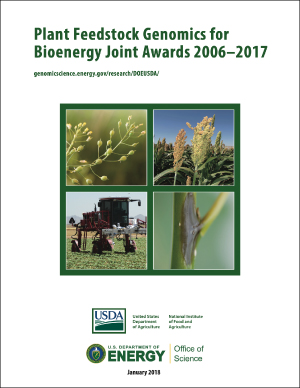USDA-DOE Plant Feedstock Genomics for Bioenergy Awards 2017
Summary of projects awarded in 2017 under Funding Opportunity Announcement DE-FOA-0001688
- Print Publication: January 2018
- Download: Print-quality PDF
Summary
Integrating the U.S. Department of Energy’s (DOE) capabilities in genomic sequencing and analysis for biofuels production with the U.S. Department of Agriculture’s (USDA) long experience in crop improvement, DOE and USDA are working together to fund projects that accelerate plant breeding programs and improve bioenergy feedstocks. Since 2006, dozens of projects have been funded by the DOE-USDA Plant Feedstock Genomics program, which is jointly supported by the Office of Biological and Environmental Research within DOE’s Office of Science and USDA’s National Institute of Food and Agriculture. This program supports fundamental biomass genomics research to provide the scientific foundation for the use of lignocellulosic and seed oil materials for bioenergy, biofuels, and co-products.
Significant advances in breeding, molecular genetics, and genomic technologies offer an opportunity to build upon the existing plant biology knowledgebase to enable confident prediction and manipulation of the biological function of plant genomes for bioenergy resources. This year, the program seeks to expand research to investigate the molecular mechanisms underlying plant resistance and tolerance to pathogens, as well as research on non-food oilseed feed-stock crops. This knowledge will be used to accelerate breeding of improved dedicated bioenergy feedstocks. Areas of interest include:
- Genomics-based research to identify and functionally characterize plant genes/alleles influencing plant response to pathogens, with a long-term focus on crop improvement;
- Genomics-based research to identify and functionally characterize plant genes/alleles influencing agronomic, yield, and quality traits of nonfood oilseed crops.
Project investigators are characterizing the genes, proteins, and molecular interactions that influence plant response to pathogens and that enhance oil yields and oil quality, with a focus on the development of new cultivars of regionally adapted, high-yielding energy feedstocks. The long-term goal is to develop a clearer understanding of the key genes and processes responsible for superior feedstock plant performance with minimal impacts on the surrounding ecological landscape.

